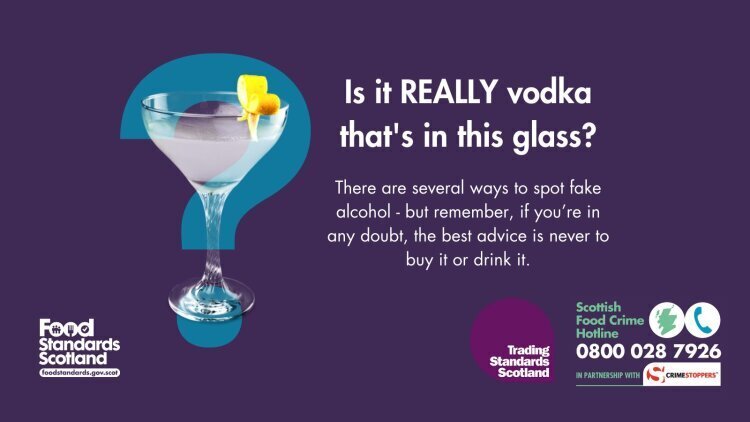News & Updates
Counterfeit alcohol can seriously damage your health, warn standards agencies

Shoppers are being warned of the serious health risks of drinking counterfeit alcohol this festive season, and being urged to look out for some obvious signs that products aren’t what they might seem.
Food Standards Scotland (FSS) and Trading Standards Scotland (TSS) say the sharp rise in food and drink sales over the festive period heightens the risk of illegal and counterfeit alcohol finding its way onto the Scottish market.
The head of FSS’ Scottish Food Crime & Incidents Unit Ron McNaughton says it’s most typically low-to-medium priced, market-leading brands of vodka and wine particularly that are being faked, invariably by producers from outside of Scotland.
Working closely with law enforcement partners from across the UK, Mr McNaughton says there is large-scale national trade in counterfeit products, which often has links to organised crime here and abroad.
Although the taste of the products can seem right, he adds, the contents, strength and quality of such products can present serious, adverse effects on people’s health.
Mr McNaughton said:
“Drinking these types of cheap products presents a huge risk to health, and in the worst case scenario, counterfeit alcohol can cause death.
“The most obvious hint that a product isn’t what it says on the label, is a low price. That should set off an alarm bell immediately for buyers, and they should simply ask themselves ‘why’.
“But the labeling, the look of the packaging, how and where the product is being sold, can also suggest something’s not right.
“Remember, these counterfeiters are most often linked with organised criminals, who are selling these dangerous products solely for an easy profit.
“So for the sake of saving a few pounds at Christmas, buying counterfeit alcohol is quite simply not worth the risk.”
FSS and TSS are urging everyone to report any products they think could be fake, to the free Scottish Food Crime Hotline (run in partnership with Crimestoppers) on 0800 028 7926 or by using the online webform - Scottish Food Crime Hotline | Crimestoppers (theiline.co.uk).
Cllr Kelly Parry, Chair of Trading Standards Scotland’s Governance Board, said:
“As we approach Christmas and New Year, we want to ensure Scottish consumers know how to recognise and avoid potentially dangerous counterfeit alcohol.
“When you buy counterfeit alcohol you have no way of knowing what ingredients it contains and how strong it is, which could lead to serious illness and intoxication following one or two drinks.
“Aside from the health risks, the trade in illicit goods is often linked to serious and organised crime and damages legitimate Scottish retailers and businesses.
“Stay safe this festive season – make sure you know what you are drinking.”
How to recognise and avoid fake alcohol:
There are several ways to spot fake alcohol - but remember, if you’re in any doubt, the best advice is never to buy it or drink it.
It’s always best to buy alcoholic drinks from retailers you know and trust
Beware of brand names you’ve never heard of, and prices that seem too lowCheck for poor-looking labels and spelling errors - a good indication the product is counterfeit
Spirits in bottles of 35cl or larger and 30% ABV or higher, need to have a duty stamp, which indicates tax has either been paid, or is due to be paid, on the contents of the bottle. It’s usually incorporated into the label or stuck on the glass. If it’s not there, it’s illegal
Vodka, the most commonly counterfeited spirit, should look completely clear, with no white particles or sediment visible in the bottle. Avoid any that is not entirely clear.
If the alcohol tastes or smells bad, don't drink it
Check the cap is sealed properly: if the seal is broken, don’t drink it - even if it’s not illegal, it could have been tampered with
Health risks from fake alcohol:
Properly produced and certified alcoholic drinks are made with ethanol – this is a type of alcohol that’s associated with lowest risk if drunk within the UK CMOs' low risk guidelines.
But fake alcoholic drinks can be produced using other types of alcohol, which may have more serious, adverse effects on your health.
Illegally produced alcohol should never be drunk, as there is no way to know what chemicals are in it and how it’s been made.
You also won’t know how strong it is because it has not been produced to the standards of commercially produced alcoholic drinks.
So as a result, you could become seriously intoxicated and acutely unwell at much lower than expected levels of consumption.
Learn more about the symptoms and risks of alcohol poisoning.